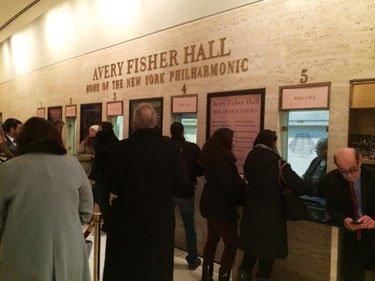Category Archive 'Philanthropy'
14 Nov 2014


“But, what has he done for me lately?” is a characteristic New York approach to memorial institutional names commemorating historic instances of philanthropy. Yet, paying off a donor’s heirs to let you take his name off the building so you can sell naming rights all over again constitutes a very special pure-New-York kind of tackiness.
New York Times:
Since its adolescence more than four decades ago, the New York Philharmonic’s home at Lincoln Center has been known as Avery Fisher Hall. Now, as the orchestra prepares for a major renovation expected to cost more than $500 million, the Fisher family has agreed to relinquish the name so the Philharmonic and Lincoln Center can lure a large donor with the promise of rechristening the building.
The unusual agreement, announced on Thursday, is a significant turnaround from 12 years ago, when the family of Avery Fisher, the music philanthropist who gave $10 million in 1973 to support the building, threatened legal action if the concert hall was rebuilt or renovated under a new name.
Lincoln Center is essentially paying the family $15 million for permission to drop the name and has included several other inducements, like a promise to feature prominent tributes to Mr. Fisher in the new lobby of the concert hall.
While the ability to raise money through naming opportunities has become a staple tool for arts organizations, perhaps no event speaks louder to its utility as a fund-raising mechanism than Lincoln Center’s willingness to pay the family of a veteran donor to step away so it can court a new benefactor.
Organizations like the Philharmonic and Lincoln Center cannot hope to raise the sums required for ambitious reconstructions or expansions without being able to dangle the carrot of a donor’s name emblazoned over the door.
“This unties the Gordian knot,†Katherine G. Farley, Lincoln Center’s chairwoman, said of the agreement. She said it was too early in the process to discuss whose name might replace Mr. Fisher’s on the building or what the price tag for such a high-profile philanthropic mantle might be.
Read the whole thing.
17 Dec 2013


Robert Reich
Kevin D. Williamson responds devastatingly to a recent editorial by Professor Robert Reich advocating increased limits on tax deductibility for private philanthropy.
Prayerful people bargaining with God over lottery numbers no doubt imagine that they would do some worthy things with that money, on top of buying a Ferrari. Progressives imagine all the wonderful things they could do with other people’s money, and no doubt some of them are well-intentioned. But envy poisons whatever good intentions they have, which is how men such as Professor Reich come to write resentful indictments of people who are, remember, giving away billions of dollars of their own money. He’d prefer their money be given away by him, or by bureaucracies under the tutelage of men such as himself. As the moral philosopher Hannibal Lecter put it: “He covets. That is his nature. And how do we begin to covet? Do we seek out things to covet? No. We begin by coveting what we see every day.â€
Megan McArdle once observed that in our public discourse, “very rich†is defined as “just above the level a top-notch journalist in a two-earner couple could be expected to pull down.†There is no envy like the envy of a $250,000 man in a world of $250 million men, as Robert Duvall’s crusty newspaper editor explains to a financially frustrated employee in The Paper: “The people we cover — we move in their world, but it is their world. We don’t get the money — never have, never will.†But being in that world, they learn to covet, which helps explain why Professor Reich’s old boss, Bill Clinton, ended up with $50-odd million in the bank after a lifetime of public service.
Americans gave away $316 billion in 2012, and will give away as much or more this year, and Professor Reich composed 731 words to explain the problems related to that. He should have composed two words, especially relevant to this season:
“Thank you.â€
26 Mar 2008


Charlotte Observer (3/23):
As a college student in Chapel Hill, John Allison stumbled across a collection of essays by Ayn Rand and was hooked by her philosophy of self-interest and limited government. As he rose over the decades to chief executive of BB&T, one of the country’s leading regional banks, Rand remained his muse.
He’s trying to replicate that encounter through the charitable arm of his Winston-Salem-based company, which since 1999 has awarded more than $28 million to 27 colleges to support the study of capitalism from a moral perspective. But on at least 17 of those campuses, including UNC Charlotte, N.C. State and Johnson C. Smith University, the gifts come with an unusual stipulation: Rand’s novel, “Atlas Shrugged,” is included in a course as required reading.
The schools’ agreements have drawn criticism from some faculty, who say it compromises academic integrity. In higher education, the power to decide course content is supposed to rest with professors, not donors. Debate about the gifts, which arose at UNCC this month, illustrates tensions that exist over corporate influence on college campuses.
UNCC received its $1 million gift pledge in 2005, but details about the “Atlas Shrugged” requirement came to light as the school dedicated an Ayn Rand reading room March 12.
“It’s going to make us look like a rinky-dink university,” UNCC religious studies professor Richard Cohen said Thursday after UNCC Chancellor Phil Dubois told the faculty council about the gift. “It’s like teaching the Bible as a requirement.”
Dubois, who learned of the book requirement this month, says it was ill-advised. He may ask Allison to reconsider it, he told faculty.
Allison has been surprised that the gifts can generate controversy. He says he simply wants students exposed to the late author’s ideas, which he believes the academic community has largely ignored. He welcomes opposing ideas.
He also points out that the schools approached the foundation, not the other way around.
Yale bent over backwards (as it were) to negotiate a deal allowing the administration to save face while accepting an alumni gift to endow a program of Gay Studies amounting to virtual advocacy. Ayn Rand’s philosophic views are hardly a less legitimate subject for academic study.
Your are browsing
the Archives of Never Yet Melted in the 'Philanthropy' Category.
/div>

Feeds
|






